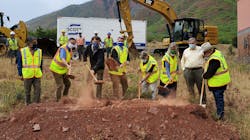More than $220 million in USDOT BUILD grants awarded to transit and passenger rail projects
The U.S. Department of Transportation (USDOT) released the official award list of 70 projects in 44 states that were selected for the $1 billion available in this round of Better Utilizing Investments to Leverage Development (BUILD) transportation discretionary grants.
Of the projects selected for grants, approximately $220.53 million was awarded to 13 projects that will deliver transit infrastructure improvements, passenger rail improvements or have an element that will improve transit capacity or access.
“This administration is making significant investments in infrastructure, and this $1 billion in BUILD grants will repair, rebuild and revitalize transportation systems across America,” said U.S. Secretary of Transportation Elaine L. Chao.
Last week, Congressional offices whose districts will benefit from the BUILD grants were notified of the funds and releases were issued detailing the grants for Greater Cleveland Regional Transit Authority (GCRTA), Kansas City Area Transportation Authority (KCATA), Roaring Fork Transportation Authority (RFTA), the city of Lexington, N.C., and the California Department of Transportation (Caltrans).
Mass Transit has provided a breakdown of the transit and passenger rail-related projects below based on USDOT’s FY 2020 BUILD Award fact sheet.
Transit-specific grants: $68 million
GCRTA has been awarded $15 million for the first phase of its Rail Car Replacement Program. The program will replace heavy-rail vehicles and make infrastructure upgrades to the rail maintenance facility, equipment and stations to accommodate the new vehicles.
KCATA, with co-applicants Port KC and Kansas City Streetcar Authority, was awarded $14.2 million for the KC Streetcar Riverfront Extension. The project will extend the KC Streetcar system from its current terminus near 3rd Street and Grand Boulevard a bit more than half a mile to reconnect the Berkley Riverfront.
In Aspen, Colo., RFTA was awarded $13 million to renovate and expand RFTA’s satellite maintenance facility into a regional transit hub.
The Red Cliff Band of Lake Superior Chippewa was awarded $5.8 million for its Transportation Renewal Project, which will construct a multi-purpose transportation center with storage and maintenance bays and transportation-related office space. The grant will also help with the purchase of two additional buses for Miskwaabekong Transit, which will expand transit capacity.
Passenger rail grants: $70.36 million
The North Central Texas Council of Governments was awarded $25 million for the North Texas Multimodal Operations, Velocity, Efficiency and Safety (NT MOVES) Program. The program will deliver rail capacity improvements for Dallas Area Rapid Transit’s Trinity Railway Express corridor that is also used by Amtrak and freight trains by double tracking a total of 3.6 miles in two sections and implementing Clear Path technology exchange information on train movement in the terminal complex.
The city of Lexington, N.C., has been awarded $24.96 million to build a multimodal passenger rail and bus station in Lexington’s Depot District, replace the 7th Avenue grade crossing with a grade-separated rail crossing at 5th Avenue and make track improvements between the two components.
Northern California passenger rail users will benefit from the $20 million awarded to Caltrans for the Stockton Diamond Grade Separation Project, which will improve the movements of freight, Amtrak and Altamont Corridor Express trains.
The Western Connecticut Council of Governments will use its $400,000 grant for the Regional Value Capture Mechanism Study that will determine whether a regional value capture mechanism, such as a Tax Increment Financing district or something comparable, can be used to generate funds to support improvements along the Metro-North Danbury and New Canaan Branch Lines in Connecticut.
Projects with transit-related elements and other mobility elements: $82.17 million
Polk County in Iowa was awarded $25 million for the Broadway Avenue Multimodal Improvements project, which will reconstruct approximately five miles of a two-lane rural arterial to a three-lane urban road. The project will provide a direct connection to the Central Iowa Trails System and improve access to transit services.
Toledo Metropolitan Area Council of Governments was awarded a $23.67-million grant for the Glass City Riverwalk project that will construct more than one mile of shared-used paths, install transient docks, add a transit stop, install a bike share hub, create a kayak share location and repair existing seawall.
The city of Norfolk, Va., was awarded a $14.4-million grant for the St. Paul’s Transformation Project, which will upgrade approximately 1.33 miles of streets and will upgrade roadways to complete streets with expanded sidewalks and streetscape improvements, dedicated bicycle facilities, wayfinding signage, transit connectivity and flood mitigation.
The Nez Perce Tribe was awarded a $19.1-million grant for the Aht’Wy Interchange Project in Lapwai, Idaho. The project will rebuild the Aht’Wy interchange and plaza area on US 95/12 to facilitate eastbound access and other improvements. The rebuild will eliminate left-turning vehicles from having to cross two lanes of oncoming traffic, which will reduce delays experienced by the local transit system and improve safety.
About the Author

Mischa Wanek-Libman
Group Editorial Director
Mischa Wanek-Libman is director of communications with Transdev North America. She has more than 20 years of experience working in the transportation industry covering construction projects, engineering challenges, transit and rail operations and best practices.
Wanek-Libman has held top editorial positions at freight rail and public transportation business-to-business publications including as editor-in-chief and editorial director of Mass Transit from 2018-2024. She has been recognized for editorial excellence through her individual work, as well as for collaborative content.
She is an active member of the American Public Transportation Association's Marketing and Communications Committee and served 14 years as a Board Observer on the National Railroad Construction and Maintenance Association (NRC) Board of Directors.
She is a graduate of Drake University in Des Moines, Iowa, where she earned a Bachelor of Arts degree in Journalism and Mass Communication.

